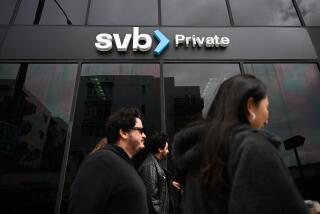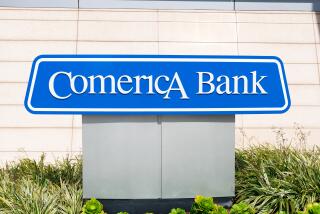Comptroller’s Report : Quarter of Southwest Banks Ailing
- Share via
WASHINGTON — About a quarter of the federally chartered banks in the Southwest are on the government’s list of institutions that need special supervision, a federal regulator said Tuesday.
Comptroller of the Currency Robert L. Clarke told the Senate Banking Committee that 118 commercial banks, “a post-Depression high,” failed in 1985, and he said that “we expect at least that many to fail in 1986.”
Under questioning by Sen. Donald W. Riegle Jr. (D-Mich.), however, Clarke stressed that, so far as federal regulators know, there are no major or large commercial banks “in a non-stable condition.”
Clarke, as Comptroller of the Currency, is the chief supervisor of the national banking system.
During the hearing before the Senate Banking Committee, he acknowledged that hardships have befallen some banks because of the steep drop in oil prices, failing farms and too many commercial real estate loans.
“There are some strains on the financial institutions in that part of the country,” Clarke said of the Southwest. “But banks seems to be handling it quite well.”
Riegle pressed Clarke to give the number of Southwest-area banks put on the special supervisory list by the Office of the Comptroller of the Currency.
“There are a large number in that part of the country,” Clarke replied.
Riegle asked if the percentage of all federally chartered banks in the Southwest that have been put on the supervisory list was 25% or closer to 50%.
“It’s closer to 25%,” Clarke replied.
Riegle also wanted to know if the balance sheet of any “problem” big bank might be getting worse.
“None, we feel, are in a non-stable condition,” Clarke said. “None is worsening.”
Lee Cross, the Office of the Comptroller’s director of communications, explained that banks are rated one to five, with one being the highest performers.
Seventy-five percent of the banks on the Office of the Comptroller’s special supervisory list are rated three, she said.
Across the country, there are 5,000 federally chartered banks. Those banks are thus under the direct regulatory purview of the Office of the Comptroller of the Currency. Cross said there are 1,490 national banks in the Southwest, with about 370 on the special supervisory list.
The regulatory agencies do not reveal the names of banks or S&L; institutions that are on problem lists.
Clarke and George D. Gould, undersecretary for finance at the Treasury Department, both urged the panel to pass legislation that would permit the banking industry to broaden the services they can offer to customers.
“This is not just a matter of competitive equity but one of competitive survival,” Gould said. He said that small banks in particular need the freedom to aid consumers and to help themselves by offering insurance, real estate brokerage and other similar local services--forbidden to the industry under current law.
Gould also said that savers who cannot afford expensive investment advisers can benefit from banks offering integrated financial planning.
“Banks are trying to adapt, straining to offer more and better services. But their common problem is that they are hemmed in by out-of-date constraints,” Gould said.
Clarke agreed, saying: “We are left with a world in which companies such as Sears, Merrill Lynch or Prudential can offer the public virtually every financial service available, but banks remain narrowly confined to products considered bank-related.
“Earnings for the industry as a whole, relative to the risks it assumes, have been mediocre,” he said.
Both officials also endorsed the idea of broadening the laws to allow non-financial institutions to acquire failing banks and savings and loans.
Sen. Jake Garn (R-Utah), the committee’s chairman, said Congress has failed to act quickly to update laws to make banks and savings and loans more competitive as the industry has changed.
“Talking about fiddling while Rome burned,” he said.
More to Read
Sign up for Essential California
The most important California stories and recommendations in your inbox every morning.
You may occasionally receive promotional content from the Los Angeles Times.













